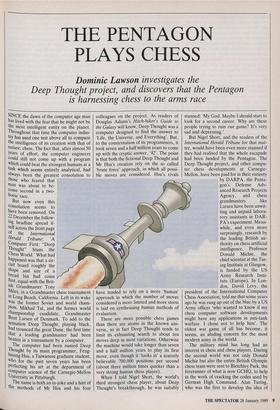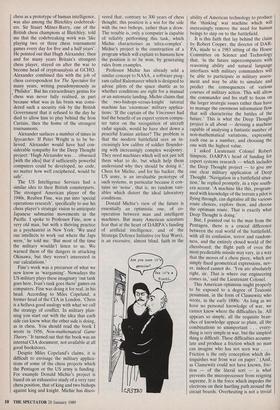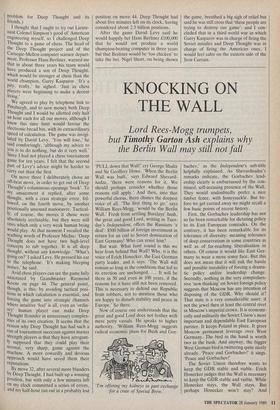THE PENTAGON PLAYS CHESS
Dominic Lawson investigates the
Deep Thought project, and discovers that the Pentagon is harnessing chess to the arms race
SINCE the dawn of the computer age man has lived with the fear that he might not be the most intelligent entity on the planet. Throughout that time the computer indus- try has used one test above all to compare the intelligence of its creation with that of nature: chess. The fact that, after almost 50 Years of effort, the computer engineers Could still not come up with a program which could beat the strongest humans at a task which seems entirely analytical, had always been the greatest consolation to those who feared that
man was about to be- come second in a two- horse race.
But now even this consolation seems to have been removed. On 2 2 December the follow- ing headline spread it- self across the front page of the International Herald Tribune: ' A Computer First: "Deep Thought" Stuns the Chess World.' What had happened was that a cir- cuit board roughly the shape and size of a bread bin had come first, equal with the Brit- ish Grandmaster .Tony Miles, in a Grandmaster chess tournament in Long Beach, California. Left in its wake was the former Soviet and world cham- Pion, Mikhail Tal, and the former world championship candidate, Grandmaster Bent Larsen of Denmark. To add to the sensation Deep Thought, playing black, had trounced the great Dane, the first time that a leading grandmaster had been beaten in a tournament by a computer.
The computer had been named Deep Thought by its main programmer, Feng- hsiung Hsu, a Taiwanese graduate student, who for the past seven years has been Perfecting his art at the department of computer science of the Carnegie-Mellon University in Pittsburgh. The name is both an in-joke and a hint of the methods of Mr Hsu and his four
colleagues on the project. As readers of Douglas Adams's Hitch-hiker's Guide to the Galaxy will know, Deep Thought was a computer designed to find the answer to `Life, the Universe, and Everything'. But, to the consternation of its programmers, it took seven and a half million years to come up with the cryptic answer, '42'. The point is that both the fictional Deep Thought and Mr Hsu's creation rely on the so called `brute force' approach, in which all possi- hle moves are considered. Hsu's rivals have tended to rely on a more 'human' approach in which the number of moves considered is more limited and more stress is laid on synthesising human methods of evaluation.
There are more possible chess games than there are atoms in the known uni- verse, so in fact Deep Thought tends to limit its exhausting search to about ten moves deep in most variations. Otherwise the machine would take longer than seven and a half million years to play its first move, even though it 'looks at' a scarcely believable 700,000 positions per second (about three million times quicker than a very strong human chess player).
When I told Nigel Short, the world's third strongest chess player, about Deep Thought's breakthrough, he was suitably stunned: 'My God. Maybe I should start to look for a second career. Why are these people trying to ruin our game? It's very sad and depressing.'
But Nigel Short, and the readers of the International Herald Tribune for that mat- ter, would have been even more stunned if they had realised that the whole escapade had been funded by the Pentagon. The Deep Thought project, and other compu- ter chess developments at Carnegie- Mellon, have been paid for in their entirety by DARPA, the Penta- gon's Defense Adv- anced Research Projects Agency, and chess The military mind has long had an interest in chess and chess players. During the second world war not only Donald Michie but also the entire British Olympic chess team were sent to Bletchley Park, the forerunner of what is now GCHQ, to help in the work of cracking the codes used by German High Command. Alan Turing, who was the first to develop the idea of
chess as a prototype of human intelligence, was also among the Bletchley codebreak- ers. Sir Stuart Milner-Barry, one of the British chess champions at Bletchley, told me that the codebreaking work was 'like playing two or three chess tournament games every day for five and a half years'. He pointed out that Hugh Alexander, then and for many years Britain's strongest chess player, stayed on after the war to become head of cryptoanalysis at GCHQ. Alexander combined this with the job of chess correspondent for The Spectator for many years, writing pseudonymously as 'Philidor'. But his extraordinary genius for chess was never fully realised, in part because what was in his brain was consi- dered such a security risk by the British Government that it refused to the day he died to allow him to play behind the Iron Curtain, then the home of the strongest tournaments.
Alexander surfaces a number of times in Spycatcher. If Peter Wright is to be be- lieved, Alexander would have had con- siderable sympathy for the Deep Thought project: 'Hugh Alexander was ... obsessed [with the idea] that if sufficiently powerful computers could be developed, no code, no matter how well enciphered, would be safe'.
The US Intelligence Services had a similar idea to their British counterparts. The strongest American player of the 1940s, Reuben Fine, was put into 'special operations research', specifically to use his chess player's strategic vision to anticipate Japanese submarine movements in the Pacific. I spoke to Professor Fine, now a very old man, but with a thriving practice as a psychiatrist in New York: 'We used our intellects to work out where the Japs were,' he told me. 'But most of the time the military wouldn't listen to us. We warned ahem of the dangers in attacking Okinawa, but they weren't interested in our calculations.'
Fine's work was a precursor of what we now know as 'wargaming'. Nowadays the US military plays these imaginary 'our tank goes here, Ivan's tank goes there' games on computers. Fine was doing it for real; in his head. According to Miles Copeland, a former head of the CIA in London, 'Chess is a helluva good analogy with what we call the strategy of conflict. In military plan- ning you start out with the idea that each side can know what the other side is doing, as in chess. You should read the book I wrote in 1956, Non-mathematical Game Theory.' It turned out that the book was an internal CIA document, not available at all good bookstores.
Despite Miles Copeland's claims, it is difficult to envisage the military applica- tions of some of the chess projects which the Pentagon or the US army is funding. For example Donald Michie's project is based on an exhaustive study of a very rare chess position, that of king and two bishops against king and knight. Michie has disco-
vered that, contrary to 300 years of chess thought, this position is a win for the side with the two bishops, rather than a draw. The trouble is, only a computer is capable of reliably performing this task, which Michie characterises as 'ultra-complex'. Michie's project is the construction of a program which will explain to humans how the position is to be won, by generating rules from examples.
Professor Michie has already sold a similar concept to NASA, a software prog- ram called Rulemaster which is designed to advise pilots of the space shuttle as to whether conditions are right for a manual or an automatic landing. Michie claims that the two-bishops-versus-knight tutorial machine has 'enormous' military applica- tions: 'If the captain of the Vincennes had had the benefit of an expert system compu- ter tutor on the recognition of aircraft radar signals, would he have shot down a peaceful Iranian airliner? The problem is that the modern battlefield sees an in- creasingly low calibre of soldier flounder- ing with increasingly complex weaponry. They need machines which will not just tell them what to do, but which help them understand why they should be doing it.' Chess for Michie, and for his backer, the US army, is an invaluable prototype of such systems, in particular because it con- tains no 'noise', that is, no random vari- ables which distort the ideal laboratory conditions.
Donald Michie's view of the future is essentially an optimistic one, of co- operation between man and intelligent machines. But many American scientists fear that at the heart of DARPA's funding of artificial intelligence, and of the Strategic Defence Initiative (or Star Wars), is an excessive, almost blind, faith in the ability of American technology to produce the 'thinking' war machine which will increasingly remove the need for human beings to step on to the battlefield.
It is this faith that lay behind the claim by Robert Cooper, the director of DAR- PA, made to a 1983 sitting of the House Committee on Science and Technology that, 'in the future supercomputers with reasoning ability and natural language interfaces with military commanders will be able to participate in military assess- ment and may be able to simulate and predict the consequences of various courses of military action. This will allow the commander and his staff to focus on the larger strategic issues rather than have to manage the enormous information flow that will characterise the battles of the future.' This is what the Deep Thought project is all about — devising a machine capable of analysing a fantastic number of non-mathematical variations, expressing each one as a number, and choosing the one with the highest value.
I asked Lieutenant Colonel Robert Simpson, DARPA's head of funding for expert systems research — which includes the Deep Thought project — to give me one clear military application of Deep Thought. 'Navigation in a battlefield situa- tion,' he replied promptly, in a ripe south- ern accent. 'A machine like this, program- med with knowledge of the terrain a pilot is flying through, can digitalise all the various route choices, explore them, and choose the optimum route. That is exactly what Deep Thought is doing.'
But, I pointed out to the man from the Pentagon, there is a crucial difference between the real world of the battlefield, with all its confusion, terror and random- ness, and the entirely closed world of the chessboard: the flight path of even the most predictable missile may vary, in a way that the moves of a chess piece, which are simply fixed geometrical expressions, nev- er, indeed cannot do. 'You are absolutely right, sir. That is where our engineering comes in,' said the Lieutenant Colonel.
This American optimism ought properly to be exposed to a degree of Teutonic pessimism, in the form of Clausewitz who wrote, in the early 1800s: 'As long as we have no personal knowledge of war, we cannot know where the difficulties lie. All appears so simple, all the requisite bran- ches of knowledge appear so plain, all the combinations so unimportant . . . every- thing is very simple in war, but the simplest thing is difficult. These difficulties accumu- late and produce a friction which no man can imagine who has not seen war . . . . Friction is the only conception which dis- tinguishes war from war on paper.' (And, as Clausewitz could not have known, fric- tion — of the literal sort — is what prevents the microprocessor from reigning supreme. It is the force which impedes the electrons on their hurtling path around the circuit boards. Overheating is not a trivial problem for Deep Thought and its friends.) I thought that I ought to try out Lieute- nant Colonel Simpson's good ol' American engineering myself, so I challenged Deep Thought to a game of chess. The head of the Deep Thought project and of the Carnegie-Mellon computer science depart- ment, Professor Hans Berliner, warned me that in about three years his team would have produced a son of Deep Thought, which would be stronger at chess than the world champion, Garry Kasparov. 'It's a pity, really,' he sighed. 'Just as chess players were beginning to make a decent living.'
We agreed to play by telephone link to Pittsburgh, and to save money both Deep Thought and I would be allotted only half an hour each for all our moves, although I knew this time limit would favour the electronic bread bin, with its extraordinary speed of calculation. The game was invigi- lated by David Levy. 'You will lose,' he said comfortingly, 'although my advice to You is to do nothing, but do it very well.' Since I had not played a chess tournament game for ten years, I felt that the second part of Levy's advice might be harder to carry out than the first.
On move three I deliberately chose an off-beat move, in order to get out of Deep Thought's voluminous openings 'book'. To mY amazement it replied, after some thought, with a crass strategic error, fol- lowed, on the fourth move, by another Positionally unsound manoeuvre. Tactical- ly, of course, the moves it chose were absolutely irrefutable, but they were still ones which only a very weak human being would play. At that moment I recalled the scathing words of Professor Michie: 'Deep Thought does not have two high-level concepts to rub together. It is all deep thought, without any knowledge.' What's going on?' I asked Levy. He pressed his ear to the telephone. 'It's making bleeping noises,' he said.
Avid chess players can see the game fully annotated by Grandmaster Raymond Keene on page 44. The general point, though, is this: by avoiding tactical posi- tions in which calculation is essential, and forcing the game into strategic channels where intuitive 'feel' is all, even an `ordin- ary' human player can make Deep Thought flounder in unnecessary complex- ities of its own creation. It seems that the reason why Deep Thought has had such a run of tournament successes against master strength players is that they have arrogant- ly supposed that they could play their normal, very sharp, game against the machine. A more cowardly and devious approach would have saved them their reputations.
By move 32, after several more blunders by Deep Thought, I had built up a winning position, but with only a few minutes left On my clock committed a series of errors, and my half-hour ran out in a probably lost position on move 44. Deep Thought had about five minutes left on its clock, having considered about 2.5 billion positions.
After the game David Levy said he would happily bet Hans Berliner £100,000 that he would not produce a world champion-beating computer in three years but that Berliner would be 'too chicken' to take the bet. Nigel Short, on being shown the game, breathed a big sigh of relief but said he was still cross that 'these people are trying to destroy our game'; and I con- cluded that in a third world war in which Garry Kasparov was in charge of firing the Soviet missiles and Deep Thought was in charge of firing the American ones, I would feel safer on the eastern side of the Iron Curtain.



















































 Previous page
Previous page